- Home
- Hammond Innes
The Angry Mountain
The Angry Mountain Read online
HAMMOND INNES
The Angry Mountain
Contents
Chapter I
Chapter II
Chapter III
Chapter IV
Chapter V
Chapter VI
Chapter VII
Chapter VIII
A Note on the Author
Chapter I
Tuček had changed a great deal. The broad shoulders sagged, his brown hair was thinning to baldness and his eyes had retreated into shadowed sockets. It was a shock to see how he had shrunk into middle age. “Dick Farrell! So it is you.” His shoulders squared as he came across to meet me. The hand he held out was soft and white with neatly manicured nails. For a fleeting moment as I shook his hand I caught a glimpse of the Jan Tuček I’d known before. He smiled. “I hope I do not keep you waiting.” In the way he spoke and in the sudden eagerness of his greeting, I found my mind switched back ten years to the sight of a shattered windshield splashed with oil, a burst of flame as I went into a dive and a voice in my earphones saying: I think I get him for you, Dick. For a moment as I held his hand it was the reckless, fanatical Czech fighter pilot I was greeting. Then memory was swamped by the present and I was looking into the tired, withdrawn eyes of Jan Tuček, head of the Tuček Steelworks in Pilsen.
“Sit down, please.” He waved me to the chair beside his desk. The secretary who had brought me in, a short, dapper little man with an uneasy smile, went out and closed the door. I became conscious then of another person in the room. He stood over against the wall, a gangling, long-limbed man with the face of a seedy intellectual. He stood there with a conscious and studied unobtrusiveness that shrieked his presence aloud. As I glanced at him uneasily, Jan Tuček said, “You see to what we are reduced here in Czechoslovakia. This is my shadow. He go with me always.”
The man jerked to life. “Mluvte česky!” There was a sort of baffled tenseness in the way he spoke.
Jan Tuček looked across at me. “You do not speak any other language but English, you understand?” It wasn’t a question. It was a statement. He knew it to be false and before I could say anything he had turned to the shadow and was speaking rapidly in Czech: “Mr. Farrell does not speak any language but English. I was with him when we fought the Germans over England. He is here as representative for a British firm of machine tool manufacturers. There is nothing political in our meeting.”
“I cannot allow you to talk without an interpreter,” the man answered.
“Then you’d better find one,” Tuček snapped, “for I’m not going to treat an old comrade-in-arms as though he is a stranger just because you are so badly educated you do not speak English.”
The man flushed angrily. Then he turned and hurried out.
“Now we can talk.” Jan Tuček smiled. The sunlight caught a flash of gold teeth. But the smile did not extend to his eyes. “But we must be quick. Soon he will return with an interpreter. Tell me, where do you stay?”
“The Hotel Continental,” I answered.
“Room number?”
“Forty-four.”
“Good. You see, it is only during my working hours that they have their spies with me. How long will you stay?”
“Till Friday,” I answered.
“Two days. That is not long. And after that—where do you go on Friday?”
“To Milan.”
“To Milan?” For the first time I saw expression come into his eyes—a quickening of interest. “If I were to come to your room very late—” He didn’t finish for the door was thrown open and his shadow entered followed by a rather plain girl with a red scarf and a hammer and sickle brooch. “And you are with this machine tool company?” he said quickly as though continuing an interrupted conversation. “Why are you no longer flying?”
I thrust my leg out for him to see.
“So you lose a leg, eh?” He clicked his tongue sympathetically. “Above the knee?”
I nodded.
“But nevertheless that should not stop you flying.”
“It doesn’t help,” I said quickly. And then, because I thought he was going to probe further, I added, “The competition’s pretty keen now with so many able-bodied fliers out of a job.”
He nodded sympathetically. “I understand. But when does this happen? When my squadron is posted you are all right.”
“Oh, it happened much later. In Italy. I crashed up near the Futa Pass between Florence and Bologna.”
“Then you are a prisoner?”
“For just over a year,” I answered. “They did three operations.”
“Three operations?” His eyebrows lifted. “But surely one is sufficient for an amputation.”
I felt the sweat breaking out on my forehead. Even now I could feel the knife and the grating bite of the saw. “They need not have operated at all,” I heard myself say. “My leg could have been saved.” Somehow I didn’t mind talking about it to him. He was so remote, someone from another world. Here, behind the Iron Curtain, what had happened to me didn’t seem to matter so much.
“Then why?” he asked.
“They wanted me to talk.”
It was out before I could check myself. I saw his eyes staring at me and then they slid away to the photographs on his desk. “But you are free,” he said. “Free to run your life as you wish to run it.”
“Yes,” I said. “Yes, I suppose so.” He meant I was free of the constant supervision that surrounded him. But I wasn’t free. You can never get free of the past. “Those pictures,” I said to change the subject. “Are they of your family?”
“Yes. My wife and daughter.” He sighed and picked up the larger photograph. “That is my wife. She is dead. The Nazis kill her. She was held up on the Swiss frontier the night I fly to England in 1939. I do not see her again.” He set the photograph down gently on the big mahogany desk. “That other is my daughter. She is now in Italy with the Czech table tennis team.”
He held the photograph out towards me and I found myself looking at the face of a girl with a broad forehead, high cheekbones and a friendly smile. Her auburn hair fell to her shoulders and gleamed where it caught the light. Something in her expression, in the way she held her head reminded me that Jan Tuček had not always looked tired and drawn. “Her mother was Italian,” he said. “From Venice.”
So the hair was real titian. “She’s very beautiful,” I said.
He laughed. “The photographer has been kind to her, I think. You cannot see the freckles.”
It didn’t matter to me whether she had freckles or not. It wasn’t the face so much as the person behind the face that was beautiful. Something about the expression of the eyes, the curve of the mouth, the defiant tilt of the chin seemed to reach out to me from the plain silver frame. It was the face of a girl who possessed sympathy and understanding—and something else; self-reliance, an ability to stand on her own feet. Somehow, in my loneliness, I felt the expression on her face was something that touched me personally through my old friendship with her father.
Tuček put the photograph down again. “Fortunately she play table tennis very well.” The way he said it, the words seemed to carry a message, and again, for a moment, I was conscious of the resemblance between his face and the face in the photograph.
“I’m sorry I shan’t see her,” I said.
“Perhaps you will—in Milan.” Again his words seemed to carry additional meaning. Then, as though he were afraid I might make some comment, he glanced at his watch and pushed back his chair. “I am sorry. I have a conference now. I will send you to the head of our retooling section. Also I will ring him so that he know who you are. I have no doubt there are things we need that you have.”
I got up. “Perhaps we could meet—” I began. But som
ething in his eyes stopped me.
“I am sorry. I am a very busy man.” He came round the big, ornate desk and shook my hand. “It has been good to see you again.” As I turned to go his hand was on my arm and he took me to the door. “Tell me. Do you hear anything of Maxwell these days?”
“Maxwell?” I started, wondering why the devil he had to talk to me about Maxwell. “No,” I said. “No. I haven’t seen him since I left Italy.”
He nodded. “He is here in Pilsen. If you should see him tell him—” He seemed to hesitate for the message and then, so softly that I could hardly catch it, he whispered, “Saturday night.” Then aloud he said, “Tell him—I shall always remember the times we had at Biggin Hill.” He opened the door for me, called to his secretary and told her to take me to pan Marič. “Good-bye,” he said. “I will telephone him that you are coming.” And he closed the heavy door.
My interview with Marič lasted nearly an hour. I was conscious of a view of one of the blast furnaces through tall, smoke-grimed windows and of alert eyes peering shortsightedly through thick-lensed, rimless glasses at my specifications. Of the details of the conversation I remember nothing. It was mostly technical. We were alone and we talked in English. I remember I answered many of his questions quite automatically, my mind going over and over again my interview with Jan Tuček. Why had he wanted to come and see me late one night? Why had he given me that message to Maxwell? I felt as though I had touched the fringe of something that could only: exist on this side of the Iron Curtain.
My interview with Marič finished shortly after four. He informed me that he would examine certain of the specifications with his technical experts and telephone me to-morrow. Then he rang for his assistant and ordered him to call one of the factory cars. As I got to my feet and pushed my papers back into my brief case, he said, “Have you known pan Tuček long, Mr. Farrell?”
I explained.
He nodded, and then with a quick glance at the door which was shut, he said in a low voice, “It is terrible for him. He is a fine man and he did great service to this country in 1939 when he fly to England with the blueprints of all new armament work in progress here including the Bren gun modifications. His wife is murdered. His father, old Ludvik Tuček, die in a concentration camp. Then, after the war, he come back and reorganise the Tučkovy ocelárny—that is to say the works here. He work like a man with a devil inside of himself, all day, every day, to make it what it is before the Germans come. And now—” He shrugged his shoulders.
“He looks very tired,” I said.
Marič peered at me through his glasses. “We are all very tired,” he said quietly. “Twice in a lifetime—it is hard to have to fight twice. You understand? It is the spirit who become tired, Mr. Farrell. Perhaps one day—” He stopped then as his assistant came in to say the car was waiting. He shook my hand. “I will telephone you to-morrow,” he said.
Outside clouds had obliterated the spring sunshine and the huge steelworks belched smoke into a grey sky. I got into the waiting car and was driven out through the gates into grey, brick-lined streets.
Back in the hotel I made a few telephone calls and then had some tea brought up to my room and did some work. I’d been behind with it ever since I’d started on the trip. I had covered Scandinavia and Central Europe, constantly adjusting my mind to different atmospheres, different languages and I felt tired. It was difficult to concentrate. And though I stayed in my room till past six, I got very little work done. My mind kept running over my interview with Jan Tuček, and always it came back to that message to Maxwell. Tell him—Saturday night. What was Max doing in Pilsen? Why was Tuček so sure I should see him?
In the end I stuffed my papers into a suitcase and went down to the lounge. It’s an odd thing, being alone in a foreign country. Impressions are heightened, everything makes a much more vivid impact. And the sense of loneliness is strong. In Prague I had had contacts. But here in Pilsen my only personal contact was Tuček and, sitting alone there in the heavy, over-ornate furniture of the hotel lounge, I had the feeling of being hemmed in—the same sort of feeling I’d had during those interminable months of captivity. The place was perfectly ordinary, the people who came in and out or sat around smoking and talking were perfectly ordinary. Yet behind the ordinariness of it all I sensed the power of something alien. I thought of Mazaryk’s suicide and set it alongside Tuček’s manner. And then I began to think about Maxwell.
It’s a queer thing, trying to escape from the past. I’d broken with flying, with all my old contacts. I’d voluntarily taken a job that would keep me wandering round Europe like a nomad. And here, behind the Iron Curtain, I had been given a message to one of the three men who knew my story. I remembered how kind Maxwell had been when I’d reported back to him at Foggia—his damnable kindness had taught me to hate myself. And now…. My mouth felt dry and harsh. The clink of glasses at the bar drew me like a magnet. For months I’d kept clear of the stuff. But now I needed a drink. I just had to have a drink. I went through into the bar and ordered a slivovice, which is a plum brandy and not the sort of drink to make one want to go on.
Nevertheless, I missed out dinner that night and took a bottle of koňak up to my room. And there I sat with the bottle and my glass in front of me, staring out at the lights in the houses opposite, smoking cigarette after cigarette, waiting for Maxwell to come. I don’t know why I thought he would come, but I did, and I was determined to be drunk when he came. I tried to analyse my state of mind. But I couldn’t. It was beyond analysis, something deep down inside of me that hated myself for the weakness that had once overwhelmed me. I stuck my leg out in front of me, the one that didn’t belong to me, and stared at it. I hated that leg. It would be with me till I died, always there to remind me of the heat and flies and the screams that were torn out of my own throat in that hospital overlooking Lake Gomo. And when I died, they’d pull it off me and give it to some other poor bastard who’d lost his flesh-and-blood leg.
It was nearly eleven and the bottle was half-empty when I heard footsteps coming down the corridor outside my room. The footsteps were heavy and solid and decisive. I knew they were Maxwell’s before he opened the door. God! Hadn’t I heard those footsteps night after night at the mess at Biggin Hill, night after night in our billet at Foggia? And I’d known he’d come—known it ever since Tuček had given me that message. I’d been sitting there, waiting for him, trying to get drunk enough to face him. Well, I didn’t care now. Let them all come and stare at me now I was drunk. I didn’t care a bloody damn for the whole lot of ’em. They hadn’t fought through the Battle of Britain, flown over sixty bomber sorties in less than two years and then … God damn them! They didn’t know what it was like to feel your nerves….
Maxwell shut the door and stood there looking at me. He hadn’t changed much. Maybe his face was a little thinner, the eyes a little more crinkled at the corners, but there was the same quick vitality, the same thrust forward of head and chin. “Drink, Max?” I asked. He didn’t say anything but came across and pulled up a chair. “Well, do you want a drink, or don’t you?” My voice sounded taut and harsh.
“Of course,” he answered and stretched over to the wash-basin for the tooth glass. He looked at me as he picked up the bottle and poured himself the drink. “So you’ve become a commercial traveller?” I didn’t say anything and he added, “Why didn’t you stick to aviation? A man with your experience—”
“You know very well why,” I answered angrily.
He sighed and said, “You can’t run away from yourself, you know, Dick.”
“How do you mean?”
“You’re your own worst enemy. Damn it, man, nobody but yourself—”
“Can’t you leave the past alone?” I shouted at him.
He caught hold of my arm. “For God’s sake keep your voice down. Nobody knows I’m here. I came up by the fire-escape.”
“By the fire-escape?” I stared at him. “What are you doing in Pilsen?”
He did
n’t say anything for a moment. He sat there, staring at me and toying with his glass, his eyes searching my face as though looking for something inside me that he wasn’t sure existed. At length he said, “You remember Alec Reece?”
I jumped to my feet, knocking over my drink. Reece! Why the hell did he have to talk about Reece? Reece was dead anyway. He’d died trying to escape. So had Shirer. They were both dead. I didn’t want to think about Reece. I’d introduced him to Maxwell—got him the job. He’d been so desperately keen to succeed on that first mission to the partigiani. He was the part of me I wanted to forget—Reece and his sister Alice. Sentences from that last letter of hers ran in a confused jumble through my head. I wanted to be proud of you…. I have forgiven you, but you must see that it is impossible…. I fumbled on the carpet for my glass, picked it up and reached for the bottle. But Maxwell took it from my hand and placed it on the other side of the table. “Sit down, Dick,” he said. “I didn’t realise—”
“What didn’t you realise?” I cut in. “Didn’t you know I was engaged to Alice Reece, that she broke it off when she knew? Why do you think I cracked up like that? A man’s mind doesn’t go—” I stopped then. The room was beginning to spin and I sat down quickly. “She thought I killed him,” I heard myself saying slowly. “And the hell of it is, she was right. To all intents and purposes—”
“Alec Reece is alive,” he said.
I stared at him. “Alive?”
He nodded.
“I don’t believe it.”
“It’s true.”
“And—and Shirer?” I asked.
“He’s alive too. Didn’t you know?”
I shook my head.
“He stayed on in Italy and bought a vineyard. He’s living …”
I didn’t hear the rest. A great load seemed to have been lifted from me. I put my head in my hands and let that feeling of relief flood through me. When I became conscious that he was shaking me, I realised that I was crying. I felt the rim of a glass against my mouth. The drink seemed to steady me. “Sorry,” I mumbled.

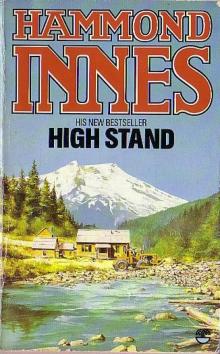 High Stand
High Stand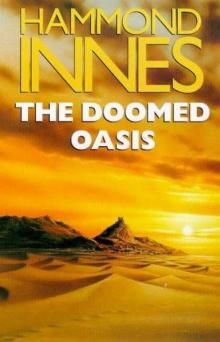 The Doomed Oasis
The Doomed Oasis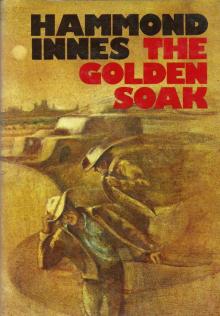 Golden Soak
Golden Soak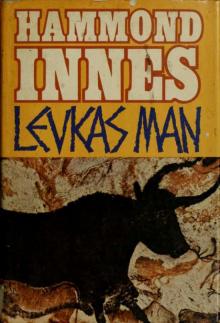 Levkas Man (Mystery)
Levkas Man (Mystery)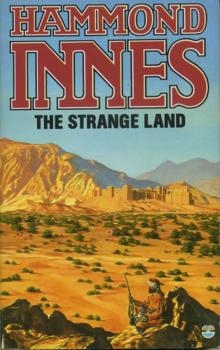 The Strange Land
The Strange Land Dead and Alive
Dead and Alive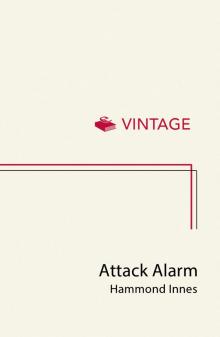 Attack Alarm
Attack Alarm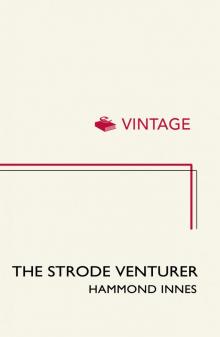 The Strode Venturer
The Strode Venturer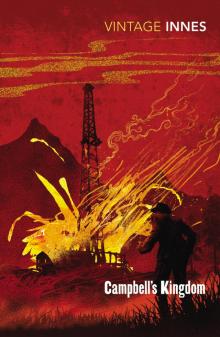 Campbell's Kingdom
Campbell's Kingdom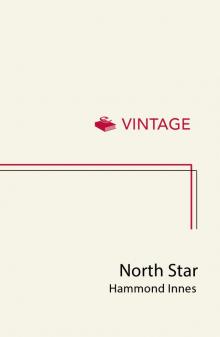 North Star
North Star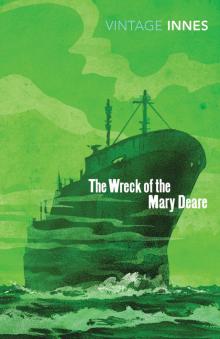 The Wreck of the Mary Deare
The Wreck of the Mary Deare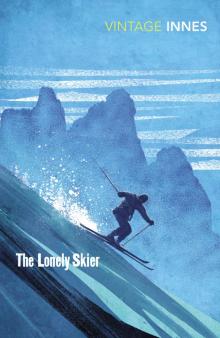 The Lonely Skier
The Lonely Skier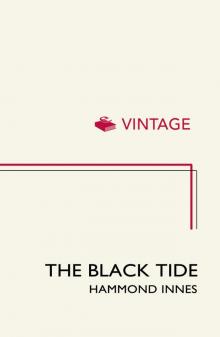 The Black Tide
The Black Tide The Trojan Horse
The Trojan Horse Medusa
Medusa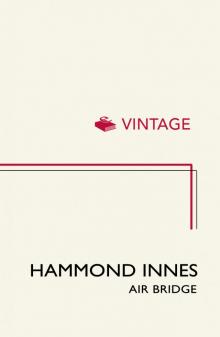 Air Bridge
Air Bridge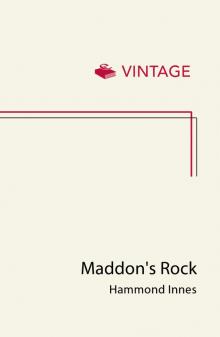 Maddon's Rock
Maddon's Rock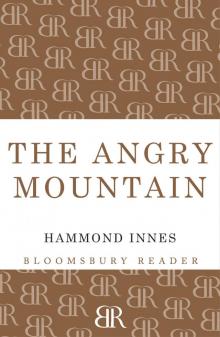 The Angry Mountain
The Angry Mountain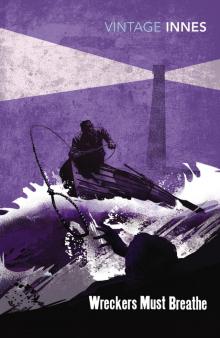 Wreckers Must Breathe
Wreckers Must Breathe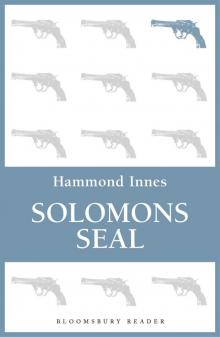 Solomons Seal
Solomons Seal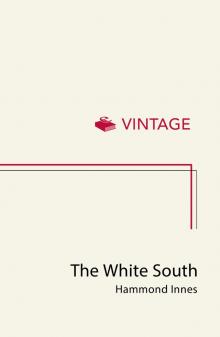 The White South
The White South